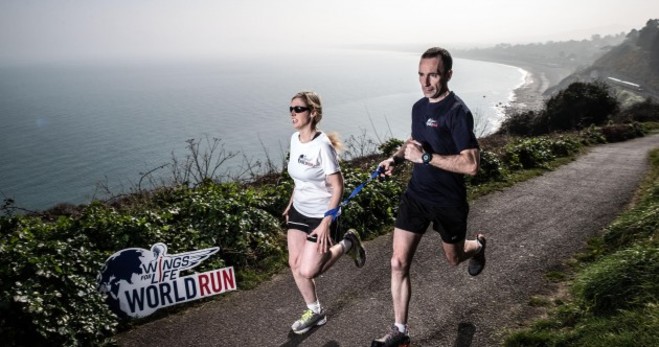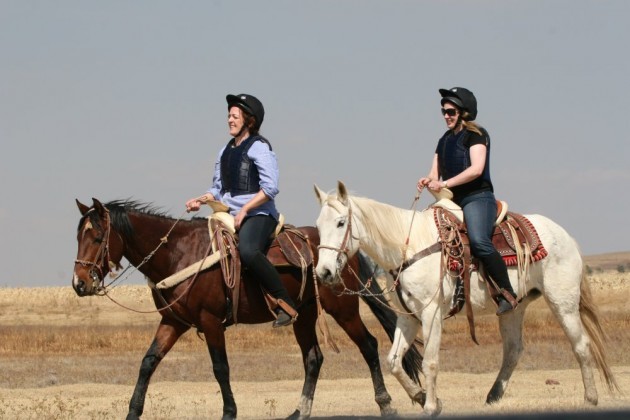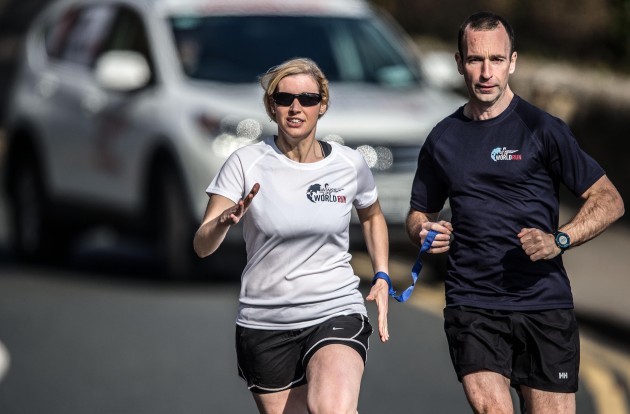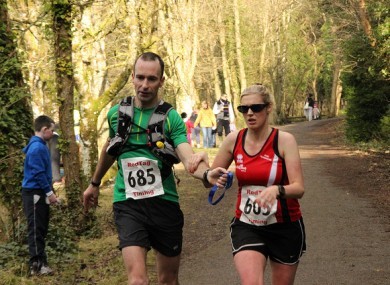“WHEN I’M TRAINING, I feel such independence when my guide is able to take off the tether on a long straight road and I’m able to run by myself. I can’t just throw on my runners and go running like most people but, for those few minutes, I feel free.”
Earlier this month, Sinead Kane came to national attention when she forced the organisers of the Women’s Mini Marathon to change their rules after they initially told her she could not compete in the event with a male guide.
However, for the 32-year old who has just 5% vision, this was just the latest in a long line of battles she had to fight to enjoy the same basic rights the rest of us take for granted.
With her mother Marian completely blind and both her father and sister having impaired vision, at home she was normal. It was only when she went to school that she was made to feel like she had a disability.
At the age of eight, she realised that being sick meant she didn’t have to go to school. Not going to school meant she wouldn’t be bullied. She decided she was going to quit school.
“When I was eight I was up in the Dáil with my mother fighting for the rights of guide dog owners,” Kane told The42 this week.
“I’d made a decision that I was quitting school to become a backing dancer for Daniel O’Donnell and I was going to tell him at a concert my mam was bringing me to in Limerick.
“However, when she went to book a B&B, she was told she couldn’t bring her guide dog. We ended up talking to TDs about it and mam even appeared on The Late Late Show.
“Eventually we were able to go and I got to meet Daniel backstage so I told him I was going to leave school because I knew all the dance moves to his songs.
“He looked at me really sternly and told me ‘Sinead, you’re not going to be my backing dancer’ and made me cry. Then he said, ‘You’re not going to be my backing dancer because life has much bigger things in store for you’.
“It was that moment that I first realised that you’re always going to have rejections and you just have to get on with it.”
Sadly, the bullying did not stop and continued right through secondary school.
“I was severely bullied because of my disability and I think that a lot of teachers just didn’t know how to deal with it. I’d go to them with bruises and they’d blame it on my eyesight rather than the bullying I was suffering.
“Like a lot of schools, they didn’t want to admit that bullying could happen there because they were afraid it would take away from the prestige of the school and acknowledging that it was happening would be to acknowledge that there is a flaw with the school.”
At 17, just six weeks before her Leaving Certificate, she took her school to the High Court to force them to provide her with a personal assistant which they had initially refused because the principal claimed it would be a stigma on the school.
At the same time, she was being told by the career guidance teacher she should forget about a career in law because of her disability. However, this only gave the teenager more impetus to succeed and, in 2009, she qualified as Ireland’s first legally blind solicitor.
However, once again she found having a disability meant that life would continue to be far from straightforward.
“I was turned down for a number of jobs in the legal field because of my disability. Because it’s indirect discrimination though, it’s hard to prove.
“So now I’m a full time researcher in DCU doing a PHD in bullying and the law and a teacher’s legal duty of care towards young people inside and outside of school.
“After the PHD is over — I’m in the second year of it now — I might go back to law but who knows?”
Kane finds one of her biggest problems is that she “doesn’t look blind enough” and when people realise she is, they sometimes can’t see past the disability.
“I was born with just 5% vision spread across two eyes which means I can just see five to six feet ahead of me but if there was a small object there, I couldn’t see it.
“While I can’t control being born blind, I can control how I’ve lived my life.
“I try to make positive choices for myself but a lot of people see me as dependent on society and taking their taxes but I’m disabled in my eyes, not in my mind but that doesn’t stop people stereotyping me.
“As I was growing up, a lot of people saw me as a neutered woman, their attitude was ‘she’s a disabled woman so obviously she won’t have sexual feelings’. They didn’t treat me like a ‘normal’ woman.
“I don’t look visually impaired to the extent that I am so there’s a temptation for me — if I want to make an initial impression on someone — to disguise it and fold away my cane and, if I’m with a friend, just link their arm instead.
“But the thing is, my disability is part of my life so why should I fold up the cane? From a young age I’ve learned the value of honesty and being true to yourself so I don’t hide the disability.”
However, while Kane doesn’t normally use her visual impairment as an excuse for anything, it is the reason she has stopped drinking. But not for the reasons you might think.
“I’m not in a relationship at the moment but my eyesight has caused difficulty. In one relationship, when we started getting serious and started talking about the possibility of having children, he broke up with me because he was worried about the children inheriting a disability.
“That’s very hurtful when you find out the person isn’t loving you for who you are.
“Being single isn’t easy either because I don’t have an iris in my eyes so if you’re up close it looks like my pupils are really dilated. When I’m out, guys try to hit on me because the dilated pupils make me look drunk and so they think I’ll be easy to get home.
“They get a shock then when I tell them I haven’t had a drink in three years.”
Coincidently, her last glass of wine coincides with being bitten by the running bug, though that’s more serendipity than any deliberate decision.
“The last time I had a drink was the day I did the Women’s Mini Marathon three years ago.
“I’d a meal with my guide and a glass of wine and since then I haven’t had a drink. I didn’t make a conscious decision, it just happened. I didn’t go out for a few weeks and when I did go out, I said I’d see how long I could last.
“It’s funny that a lot of the running chapter of my life revolves around the Mini Marathon. I hadn’t ran in school and was usually left on the bench when it came to PE or sports.
“But in March 2012 I was approached by Child Vision to run that year’s race and it was only after I’d already committed to it that I asked myself what it would entail.
“I was a little taken aback that nobody considered the fact that I’d need a guide and I found it very difficult to get one. To be fair to Child Vision they found someone but she was a personal trainer and wanted to do all this work in the gym whereas I wanted to get out on the road and experience the challenges that would come with doing the race itself.
“So eventually my mother found me a guide and I trained from April to June, three days a week. I’d a goal of completing the race in one hour and I did it in 55 minutes and raised two grand for Child Vision so I was really happy.”
Now that she’d completed the 10k course, Kane wondered what she could do next.
“I joined my guide’s running club because the Mini Marathon had built up my confidence. However, I soon got frustrated because I felt a little like I was being wrapped up in cotton wool and couldn’t compete to the best of my ability.
“My sister found me a new guide in June 2013 and we set out to train for the Frank Duffy 10 mile race with a target of 90 minutes and I completed it in 84.”
Having hoped to race in a half-marathon just a few weeks later, Kane ended up in hospital with dehydration and instead set her next goal as the Cork half-marathon in 2014 which she completed six minutes under her goal time of two hours.
It was only then that Kane considered pushing herself even further.
“I never had any ambition to run a full marathon but after completing the half I thought I might as well do the rest. When you can’t see the distance it almost feels closer to you and because I don’t drive either, I don’t think I could really comprehend the distance involved.
“I approached Childline about running it for them but the first setback came when my guide for the half marathon couldn’t join me because of work commitments. I asked around Cork, appeared on local radio and in the local papers appealing for a guide but nobody came forward.
“This was July with the marathon in October and I was a bit embarrassed by the whole thing to be honest. But I thought I’d put out a tweet and see if that would help and at that stage a few people came forward.
“An ultra-runner in Dublin seemed the best for my level so I’d train during the week and then travel up to him in Dublin at the weekend to do my long run. It meant I was travelling for six hours to do a 90-minute or two-hour run but I thought it was worth it.”
However, because she was trying to catch up, Kane ignored a knee injury and ultimately missed three weeks of training close to the marathon date. She still had breaking the four-hour barrier as her goal though.
“I never once thought what would happen if my guide wasn’t as good as me. I was more worried about the crowd, about people pushing against me. But at the end of the race, with two miles to go, my guide couldn’t keep up so I left him behind and ran on my own.
“Other participants helped me over those final two miles but I finished in 4:01 and I was devastated. For the first time in ages I felt as if my disability had held me back because I knew if I could see properly I could have ran a quicker time.”
By this stage, Kane had met John O’Regan while filming a documentary about training for the marathon and he’d given her some tips about running with a guide before taking to the course.
“Since I’ve been in contact with John, he’s made me realise my potential. He’s been a very positive influence on me in terms of training, diet, everything. I never considered how much effort goes into running until John came along.”
And it was O’Regan’s support during this month’s struggle with the organisers of the Mini Marathon that stopped Kane from quitting running altogether.
“When all this happened with the Mini Marathon, I said I was giving up running because what was the point if nobody believes in me. All I want to do is have the chance to be as competitive as anyone else, not just complete the course.
“John asked me not to give up because he sees a lot of potential and when you don’t believe in yourself, when others do it it helps you through those low points.
“And now that I’m training with John, I know that he knows what he’s doing, that he’s fitter, faster and stronger than me so I no longer feel like my times are being compromised.”
After news broke about the Mini Marathon, Red Bull approached Kane to take part in their Wings for Life event in Brazil.
“I’m very happy that Red Bull has given me this opportunity. This is all about helping people run who can’t run and that’s what John does with me.
“It just goes to show the type of person he is as he was supposed to do the Wings for Life race in India because he won the Irish one last year but he has now given up that opportunity for the chance to run with me as my guide in Brazil.
“He said to me ‘Sinead, I’ve won races before and, for me, knowing you get to run a race is as good a feeling.’”
After the race in Brazil, Kane is not sure what she’ll do next but she is considering a shot at the Paralympics.
“I recently found out the standard for the Paralympics is 3:10. Could I actually see myself getting that? One side of my brain says you’re going to be 33 next month which is when most people are finishing their career not starting it but the other side of my brain is telling me to go for it.
“Maybe I can get to it? But if I do I know I’ll have to sacrifice something, maybe I’ll never have kids if I go for it?”
Whatever happens, Kane knows her battle with the Mini Marathon organisers won’t be the last obstacle she encounters in her life. Running though, will always provide her with an outlet for any frustrations.
“I’m constantly having to fight for my rights but when I’m training I feel such independence when my guide is able to take off the tether on a long straight road and I’m able to run by myself. I can’t just throw on my runners and go running like most people but, for those few minutes, I feel free.
“I’ve achieved a lot in a year and a half. The Mini Marathon was a big setback but I’m getting to go to Brazil on the foot of it. When you’re in the thick of a setback you might not see that good could come from it but.
“Even if this race in Brazil didn’t come about, the fact I got policy changed that would help other people looking to run the Mini Marathon, that would be enough for me.
“The way I look at is is, you can be blind, but you can see fully in your mind too. You can see the real challenges people face. Being a runner just adds to that. Self-acceptance is the greatest gift you can give yourself.
“For a long time, when I was being bullied, I tried to change myself but then I realised I could succeed just the way I was. Everyone can.”
You can find more information on Sinead Kane on her website.




